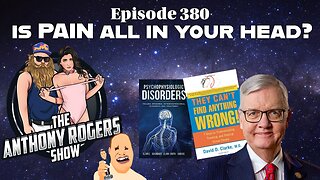Premium Only Content

Why Do We Dream?
Dreaming is a universal phenomenon that has fascinated humans for thousands of years. Despite centuries of research, however, the exact function and purpose of dreaming remain a mystery. While there are many theories about why we dream, there is no one definitive answer, and the field continues to evolve as new research is conducted.
One of the earliest and most enduring theories about dreaming is that it serves as a kind of "safety valve" for the brain. According to this view, dreams are a way for the brain to discharge pent-up emotions and desires that might otherwise overwhelm us in waking life. This theory was popularized by Sigmund Freud in the early 20th century, and although it has fallen out of favor in recent years, it remains an important part of the history of dream research.
Another popular theory about dreaming is that it serves a cognitive function, helping the brain to process and consolidate memories. During sleep, the brain may replay and integrate information from the day, helping to solidify learning and information retention. This theory is supported by studies that have shown a correlation between dreaming and improved memory consolidation.
More recently, some researchers have proposed that dreaming is a way for the brain to simulate and prepare for future events. According to this theory, dreams might be a kind of virtual reality training ground, where we can practice coping with difficult or challenging situations before they actually happen. This idea is supported by studies that have shown that people who dream more frequently are better at problem-solving and decision-making.
In addition to these cognitive functions, dreams may also serve an emotional regulation function. Dreams may provide a space for the brain to work through complex or intense feelings, allowing us to process difficult emotions in a safe environment. This theory is supported by studies that have shown that people who experience more frequent nightmares or other negative dream experiences may be at increased risk for anxiety and depression.
There is also some evidence to suggest that dreams may have an evolutionary purpose. Some researchers have suggested that dreaming may have played an important role in human evolution, helping our ancestors to rehearse and prepare for potential dangers and challenges. For example, dreaming about being chased or attacked may have helped early humans to develop the fight or flight response necessary to survive in a dangerous environment.
While there is still much debate about the exact function and purpose of dreaming, there is no doubt that dreams play an important role in our lives. They offer us a window into the workings of our own minds, and a chance to explore the vast potential of the human brain. Whether they serve to process memories, regulate emotions, or prepare us for the future, dreams are a fascinating and mysterious part of the human experience. As we continue to unravel their mysteries, we are sure to discover even more about the complex and intriguing world of dreaming.
#whydowedream
#WhyDream
-
 LIVE
LIVE
Flyover Conservatives
11 hours agoOnly 17% of Millennials Hit These 5 Adult Milestones—Why?; What If Childhood Trauma Is Behind Your Health Problems? - Dr. Troy Spurrill | FOC Show
404 watching -

HogansAlleyHero
13 hours ago💥CHASING DOPAMINE💥✅TRUMP SAYS BATTLEFIELD IS THE BEST✅
2.24K -
 1:57:40
1:57:40
MattMorseTV
4 hours ago $6.62 earned🔴Trump just SHATTERED the PROJECTIONS.🔴
34.3K21 -
 LIVE
LIVE
megimu32
2 hours agoOTS: From Star Search to Superstardom
72 watching -
 LIVE
LIVE
Joker Effect
1 hour agoInterviewing GREENMAN! Looks like he is coming to Rumble! Let's give him a warm welcome! REAL TALENT
443 watching -
 LIVE
LIVE
Anthony Rogers
8 hours agoEpisode 380 - Is Pain All In Your Head?
33 watching -
 1:46:17
1:46:17
Glenn Greenwald
6 hours agoGlenn Takes Your Questions on Censorship, Epstein, and More; DNC Rejects Embargo of Weapons to Israel with Journalist Dave Weigel | SYSTEM UPDATE #505
96K6 -
 LIVE
LIVE
Jokeuhl Gaming and Chat
7 hours agoHelldivers 2 - Spreading Democracy w/ Ryker
59 watching -
 27:47
27:47
Stephen Gardner
2 hours ago🚨BREAKING: Trump FURIOUS Over Kamala’s Latest Move – SHOCKING Details!
12.6K48 -
 8:00:13
8:00:13
Dr Disrespect
11 hours ago🔴LIVE - DR DISRESPECT - GEARS RELOADED GLOBAL LAUNCH - CRUSHING LOCUST
106K13